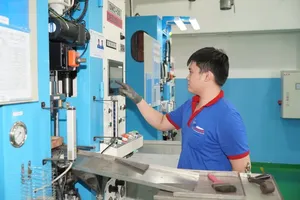
Currently, the mobilization interest rate on the market for a 12-month term has reached 6 percent a year, and for an 18-month term, it has reached 6.1 percent per year, after hitting a bottom of around 4 percent per year in March of this year.
Faced with this situation, the State Bank of Vietnam decided to reduce two operating interest rates two days ago. Under the state bank’s decision, the lending rate for open market operations (OMOs) and the treasury bill interest rate brought the rates on these two channels to 4.25 percent, a decrease of 0.25 percent. This is the first time the State Bank has reduced the OMO interest rate since the end of 2023.
Executive Director Dinh Duc Quang of Treasury at UOB Vietnam Bank said that banks are increasing their mobilization interest rates to make the savings channel competitive with other investment channels in the market. Because the low level of mobilization interest rates has caused deposits into banks to slow down in the context of credit demand beginning to recover.
In the last few months of the year, savings interest rates could increase by an additional 0.5 percent -1 percent yearly, depending on the term. However, the most important thing is that even though input interest rates are increasing, the banking system is still maintaining low lending rates to support the economic recovery, Mr. Quang forecast.
Lending interest rates are still at a low level even though input interest rates have increased since the bottom in March 2024. Not only in the production and business sector but also the lending interest rate for real estate is quite soft. Specifically, the group of state-owned commercial banks is applying a home loan interest rate ranging from 5 percent to 7 percent annually while the group of joint-stock commercial banks has a home loan interest rate ranging from over 4 percent to 8 percent per annum.
Leaders of commercial banks said that the lending interest rate at banks has decreased the most in the last 10 years, including a sharp decrease in real estate lending interest rates. From now until the end of the year, it is forecast that the real estate market will have many positive signs and home buyers’ increasing demand for housing will be the driving force for banks' credit to grow better.
Deputy Director Nguyen Duc Lenh of the State Bank of Vietnam in Ho Chi Minh City branch said that real estate credit in Ho Chi Minh City has maintained positive growth for 3 months from March to May 2024, accounting for 28 percent of the total outstanding credit in the area and increasing 2.78 percent compared to the end of 2023, higher than the overall credit growth in the area.
The good growth of real estate credit in the past, especially credit for home purchases, comes from various factors, including low interest rates. In the context of the economy's low capital absorption, the growth of the real estate market will have a positive impact on other industries and sectors, including banking credit activities, Mr. Lenh commented.
























